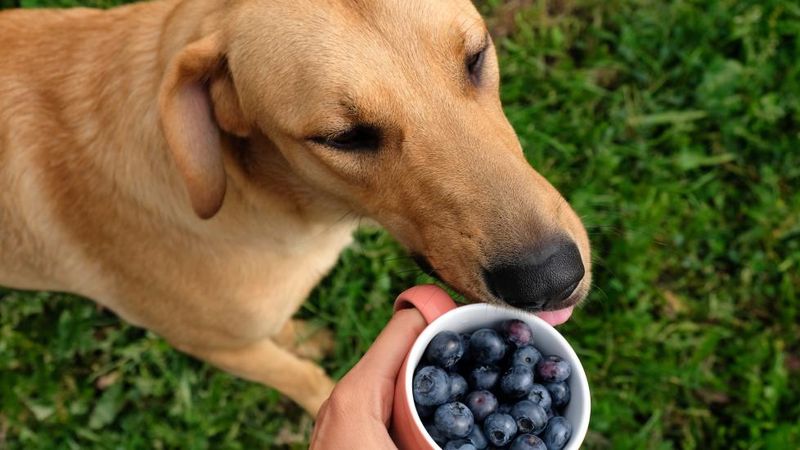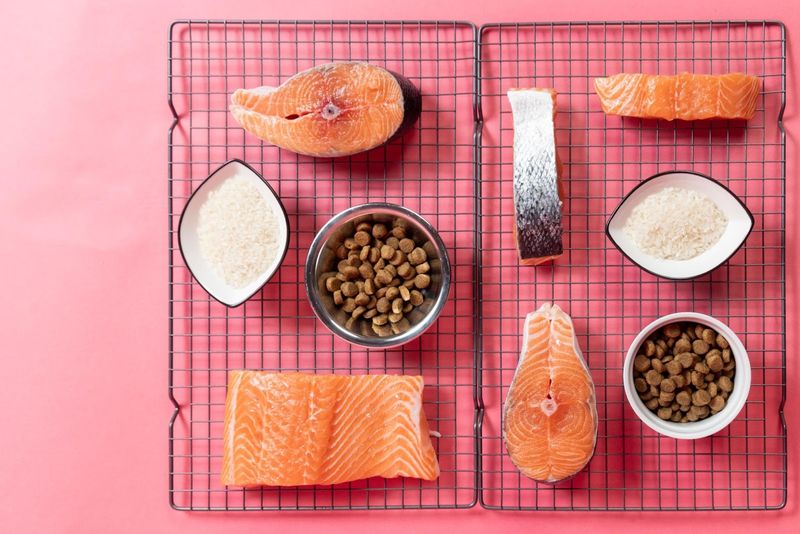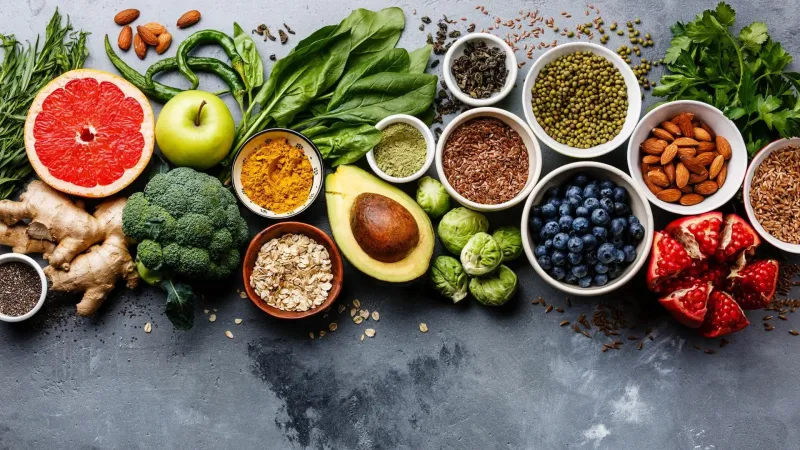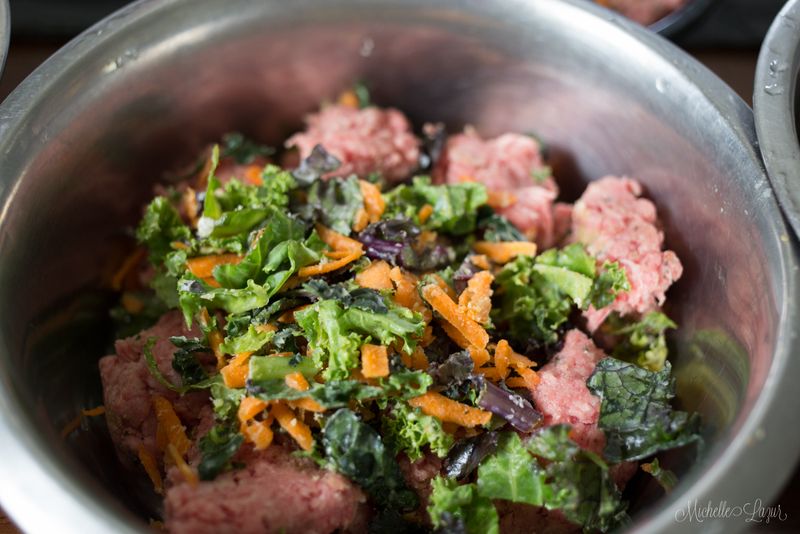Discover how the right diet can extend your dog’s life. Our four-legged friends deserve the best nutrition, and certain foods have been shown to promote longevity and vitality. Here, we explore 18 specific foods that veterinarians recommend for a longer, healthier life for your canine companion. Learn why each of these foods is beneficial, how they contribute to your dog’s overall well-being, and how you can easily incorporate them into their diet.
Blueberries
Blueberries are not only delicious but also packed with antioxidants that combat free radicals, reducing oxidative stress in dogs. These tiny berries can improve cognitive function and support heart health. Antioxidants like vitamin C and K help in maintaining a robust immune system. Adding a few blueberries to your dog’s diet can enhance its overall vitality. However, moderation is key due to their sugar content. Consider mixing them into their food or offering them as an occasional treat. Blueberries are easy to serve and can be a delightful snack during training sessions.
Carrots
Crunchy and sweet, carrots are a fantastic addition to your dog’s diet. These vibrant veggies are rich in beta-carotene, which is essential for maintaining healthy vision and a strong immune system. Moreover, chewing on carrots helps to reduce plaque buildup, promoting good dental health. Carrots are low in calories, making them an excellent snack for dogs needing to maintain a healthy weight. They can be served raw, cooked, or even frozen for a refreshing treat. Dogs generally enjoy the satisfying crunch and sweet flavor of carrots.
Pumpkin
Pumpkin is a nutritional powerhouse for dogs, packed with fiber and essential vitamins like A, E, and C. This orange vegetable aids in digestion, helping with both constipation and diarrhea. Its fiber content promotes a healthy gut, while its natural sweetness makes it a palatable treat. Incorporating pumpkin into your dog’s meals can improve their overall digestive health. Whether served pureed or mixed with regular food, pumpkin is a versatile ingredient. Its health benefits extend beyond digestion, supporting a dog’s vision and immune system as well.
Salmon
Salmon is an excellent source of omega-3 fatty acids, which are essential for maintaining a healthy coat and skin. These fatty acids also contribute to reducing inflammation and supporting joint health, particularly in older dogs. Salmon’s high-quality protein provides energy and aids in muscle maintenance. When introducing salmon to your dog’s diet, ensure it’s cooked to avoid harmful parasites. Offering it as a main meal or a treat, salmon’s rich flavor will likely be a hit with your pet. Its nutritional benefits make it a favorite among veterinarians.
Sweet Potatoes
Sweet potatoes are a nutritious and tasty treat for dogs, rich in dietary fiber, vitamins A, C, and B6. These root vegetables support digestive health and provide a slow-release energy source, helping to maintain stable blood sugar levels. Their natural sweetness is appealing to dogs, making them a great addition to meals or a standalone snack. Sweet potatoes are versatile; they can be boiled, baked, or mashed. Providing them to your dog enhances their diet with essential nutrients, promoting overall health and well-being. Ensure to serve them plain, without any harmful additives.
Spinach
Spinach is a leafy green that offers numerous health benefits for dogs. Packed with iron, antioxidants, and fiber, it supports muscle health, improves digestion, and boosts the immune system. Spinach’s nutrient profile includes vitamins A, C, and K, which are vital for a dog’s overall health. It can be served cooked or raw, depending on your dog’s preference. Adding spinach to meals can help in detoxifying the body and improving energy levels. Despite its many benefits, spinach should be given in moderation to prevent potential kidney issues.
Apples
Apples are a sweet and crunchy treat packed with vitamins A and C, which help support your dog’s immune system and promote healthy skin and coat. They are also a good source of fiber, aiding in digestion. When giving apples to your dog, make sure to remove the seeds and core, as they can be harmful. This fruit can be served as a fresh snack or mixed into regular meals for a refreshing twist. Its natural sweetness and satisfying crunch make apples a popular choice among dog owners.
Turmeric
Turmeric is a spice known for its anti-inflammatory properties, beneficial for dogs with joint pain or arthritis. Curcumin, the active compound in turmeric, helps in enhancing brain function and fighting chronic diseases. Adding a small amount of turmeric to your dog’s diet can improve their overall health and longevity. It is best served with black pepper to enhance absorption. Introduce turmeric gradually to avoid digestive issues, and consider consulting with a vet for proper dosage. Its potential to reduce inflammation makes turmeric a valuable addition to your pet’s nutrition.
Eggs
Eggs are a complete source of protein, packed with essential amino acids that support muscle growth and repair. They also contain vital nutrients like vitamins D, B12, and riboflavin, which contribute to a dog’s overall health. Serving eggs to your dog can promote a shiny coat and healthy skin. Whether boiled, scrambled, or cooked in other ways, eggs provide an easily digestible and nutritious meal option. However, it’s important to avoid adding any seasoning or oils. Eggs are a simple yet effective addition to a balanced diet, offering a range of health benefits.
Oats
Oats are a wonderful grain for dogs, especially those with wheat allergies. They are rich in fiber, helping to regulate digestion and maintain a healthy weight. Oats also provide essential minerals like iron and zinc, supporting metabolic function. Their calming properties can soothe a dog’s nervous system, making them a great meal choice for anxious pets. Served cooked and plain, oats are versatile and can be mixed with other ingredients to enhance flavor. Incorporating oats into your dog’s diet can provide long-lasting energy and nutritional benefits.
Yogurt
Yogurt is a probiotic-rich food that supports healthy gut flora in dogs, enhancing digestive health. The calcium and protein content in yogurt also contribute to strong bones and muscles. When selecting yogurt for your dog, opt for plain, unsweetened varieties to avoid harmful additives. Mixing yogurt with fruits or serving it as a standalone treat can provide a cooling sensation, especially in warm weather. Yogurt’s health benefits extend beyond digestion, promoting a robust immune system. It’s a delicious and nutritious supplement to your canine’s diet.
Flaxseeds
Flaxseeds are tiny powerhouses of nutrition, rich in omega-3 fatty acids and fiber. They support heart health and improve skin and coat condition. The anti-inflammatory properties of flaxseeds can benefit dogs with allergies or arthritis. Ground flaxseeds are easier for dogs to digest and absorb. They can be sprinkled over meals or mixed into treats, providing a nutty flavor that dogs enjoy. Incorporating flaxseeds into your dog’s diet can promote overall wellness and vitality. Their versatility makes them a valuable addition to various recipes and meal plans.
Coconut Oil
Coconut oil is a versatile supplement for dogs, known for its anti-inflammatory and antibacterial properties. It supports skin health, promoting a glossy coat and alleviating itchiness. Coconut oil also aids in digestion and boosts energy levels. Adding a small amount of coconut oil to your dog’s meals can enhance flavor and provide essential nutrients. It’s important to introduce it gradually to avoid digestive upset. Besides dietary benefits, coconut oil can be used topically to treat minor skin irritations. Its multiple uses make it a popular choice among dog owners.
Chia Seeds
Chia seeds are a nutritional gem for dogs, packed with omega-3 fatty acids, fiber, and antioxidants. They aid in maintaining a healthy weight and support a strong immune system. The hydrating properties of chia seeds help in keeping dogs well-hydrated, especially in hot weather. These tiny seeds can be easily added to your dog’s diet by mixing them with water or sprinkling them over food. Chia seeds offer a mild, nutty flavor that dogs find appealing. Their nutrient profile makes them an excellent addition to a balanced diet.
Broccoli
Broccoli is a superfood, offering numerous health benefits to dogs. Rich in vitamins C and K, it supports a strong immune system and bone health. The high fiber content aids in digestion, while antioxidants combat inflammation. Broccoli should be served in moderation, as excessive amounts can cause digestive issues. Steaming or boiling the florets helps retain nutrients while making it easier to digest. Dogs generally enjoy broccoli’s crunchy texture and mild flavor. It’s a healthy, low-calorie treat that can be added to your dog’s meals or given as an occasional snack.
Green Beans
Green beans are a low-calorie, high-fiber vegetable that can benefit dogs looking to maintain a healthy weight. They are packed with vitamins A, C, and K, promoting a strong immune system and overall health. The crunchy texture of green beans makes them a satisfying treat for dogs. They can be served raw, steamed, or boiled, depending on your dog’s preference. Incorporating green beans into meals helps provide essential nutrients and aids in digestion. Their versatility and nutritional value make them a favorite among dog owners.
Bone Broth
Bone broth is a nutritional elixir for dogs, rich in collagen, glucosamine, and amino acids. It supports joint health, aids in digestion, and boosts the immune system. The savory flavor of bone broth is irresistible to dogs, making it an excellent addition to their diet. Whether served alone or mixed with meals, it provides a hydrating and nourishing supplement. Bone broth is particularly beneficial for older dogs, providing essential nutrients for maintaining mobility. Preparing bone broth at home ensures quality and allows customization to suit your dog’s needs.
Kale
Kale is a leafy green superfood packed with vitamins A, C, and K, as well as calcium and antioxidants. It supports bone health, boosts the immune system, and aids in detoxification. The fibrous nature of kale helps with digestion and weight management. Serving kale to your dog can be done by lightly steaming or chopping it into small pieces. Its slightly bitter taste may need some adjustment, but many dogs enjoy its crunchy texture. Incorporating kale into your pet’s diet provides a nutritional boost and helps maintain overall health.


















